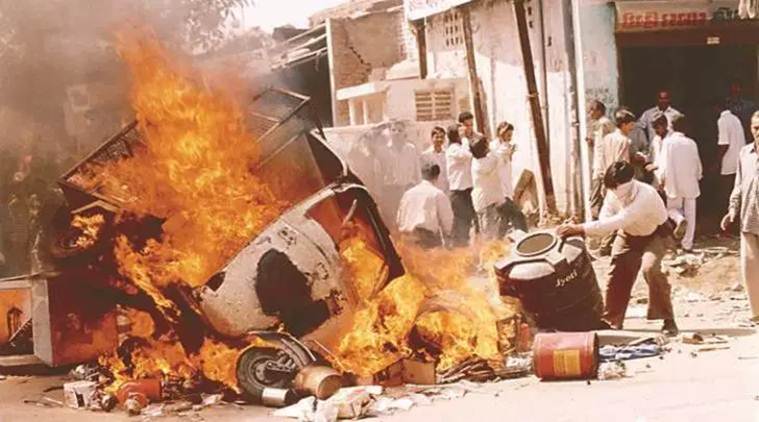 The Ode massacre was one of the nine most gruesome cases of the post-Godhra riots investigated by the Supreme Court-appointed Special Investigation Team. (File)
The Ode massacre was one of the nine most gruesome cases of the post-Godhra riots investigated by the Supreme Court-appointed Special Investigation Team. (File)
TWO WEEKS after Supreme Court released them on bail, 13 people who were sentenced to life for their role in a 2002 post-Godhra riot case in Gujarat have reached Indore and Jabalpur, where they will have to engage in social or community service, or spiritual activity, as ordered by the court, until their appeals against conviction are decided.
On March 1, 2002, 23 people were burnt alive in Ode village of Gujarat’s Anand district, two days after the Godhra train carnage.
The victims had taken shelter in a three-story residential building to escape a mob that was targeting Muslim homes. The mob shut the doors from outside and set the building on fire by throwing pouches filled with petrol and kerosene.
In 2012, a special court convicted 23 people, and acquitted 23 others. One of 18 accused sentenced to life imprisonment by the trial court died before his appeal was decided by Gujarat High Court. The HC acquitted three and the remaining 14 convicts moved the Supreme Court to challenge their conviction.
On January 28, a bench of CJI S A Bobde and Justices B R Gavai and Surya Kant granted conditional bail to 14 people and barred them from entering Gujarat until their appeals against conviction were decided.
While six were told to report to Palasia police in Indore on the first day of each month, the others were asked to report at Civil Lines Police Station, Jabalpur, and not leave the districts without permission.
The court said the appellants should engage in any spiritual programme or do social/community services for a minimum six hours each week. It asked the member-secretary of Madhya Pradesh State Legal Services Authority to produce a certificate that they are regularly engaged.
Indore District Legal Aid Officer Subhash Chaudhary told The Indian Express that the authority will help them find employment and a place to live and also finalise a place where they could be engaged in spiritual or community work.
Chaudhary met authorities of MY Hospital, Indore, on Tuesday to explore the possibility of engaging the convicts at the government hospital’s canteen.
He said efforts would be made to engage them for the court-mandated activity at a stretch for six hours, possibly on Sunday, and let them work to earn livelihood on weekdays.
Although the convicts agreed to do any job assigned to them, they have told the Authority that they would prefer farming because that’s the only thing they know, and it would allow them to work together. They engaged in farming whenever they were out on parole.
The convicts will have to spend on their food and stay, and their family members could come and meet them in Indore. “Given the case background, they will find it difficult to find livelihood and a place to live on their own,” Chaudhary said.
Seven other convicts turned up at the Civil Lines Police Station on Monday. A police official said they have been accommodated at a Jain organisation till they find a place to live. An official in the district legal aid authority said the convicts will be engaged in a variety of activities depending on their individual capacity by taking help of NGOs.
Given the sensitive nature of the case and the fact that Jabalpur is a communally sensitive town, the Authority decided not to highlight their activities. The apex court order has not given any direction on providing them security. From making them work in a gaushala to working in an old-age home run by the Red Cross to taking their help to spread awareness about traffic rules and engaging them in plantation on Madan Mahal hills, the Authority explored various ways to keep them engaged.
The Authority explored the option of using the services of a convict, who is Commerce graduate but is aged, to teach inmates of an observation home. Another option explored was to use their services in a Jaipur foot camp in government medical college.